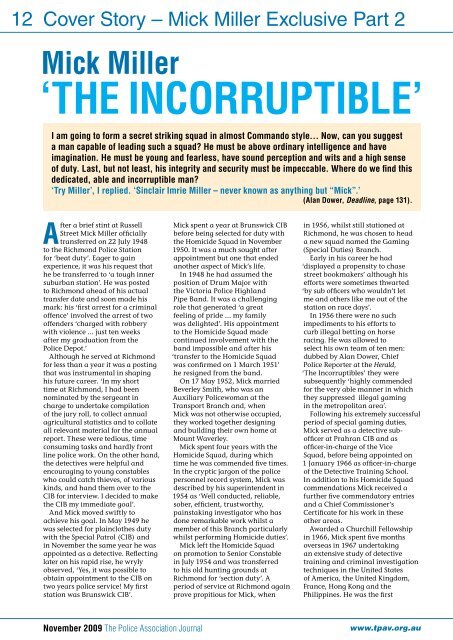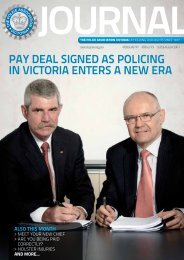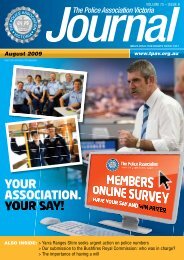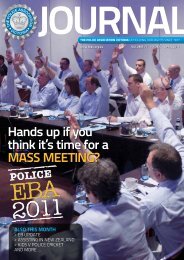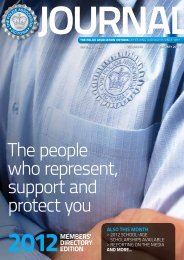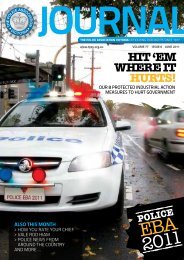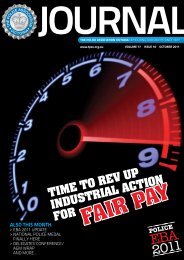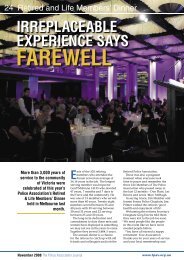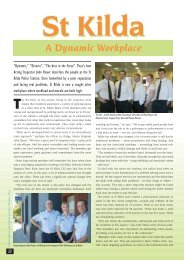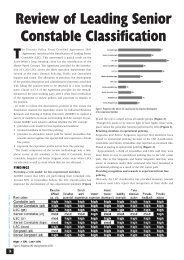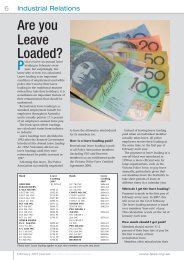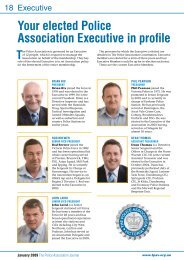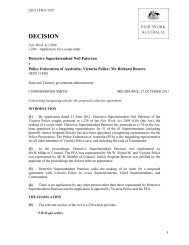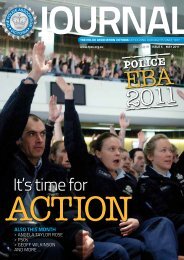The Police Association Journal november 2009
The Police Association Journal november 2009
The Police Association Journal november 2009
Create successful ePaper yourself
Turn your PDF publications into a flip-book with our unique Google optimized e-Paper software.
12<br />
Cover Story – Mick Miller Exclusive Part 2<br />
Mick Miller<br />
‘<strong>The</strong> Incorruptible’<br />
I am going to form a secret striking squad in almost Commando style… Now, can you suggest<br />
a man capable of leading such a squad? He must be above ordinary intelligence and have<br />
imagination. He must be young and fearless, have sound perception and wits and a high sense<br />
of duty. Last, but not least, his integrity and security must be impeccable. Where do we find this<br />
dedicated, able and incorruptible man?<br />
‘Try Miller’, I replied. ‘Sinclair Imrie Miller – never known as anything but “Mick”.’<br />
(Alan Dower, Deadline, page 131).<br />
After a brief stint at Russell<br />
Street Mick Miller officially<br />
transferred on 22 July 1948<br />
to the Richmond <strong>Police</strong> Station<br />
for ‘beat duty’. Eager to gain<br />
experience, it was his request that<br />
he be transferred to ‘a tough inner<br />
suburban station’. He was posted<br />
to Richmond ahead of his actual<br />
transfer date and soon made his<br />
mark: his ‘first arrest for a criminal<br />
offence’ involved the arrest of two<br />
offenders ‘charged with robbery<br />
with violence … just ten weeks<br />
after my graduation from the<br />
<strong>Police</strong> Depot.’<br />
Although he served at Richmond<br />
for less than a year it was a posting<br />
that was instrumental in shaping<br />
his future career. ‘In my short<br />
time at Richmond, I had been<br />
nominated by the sergeant in<br />
charge to undertake compilation<br />
of the jury roll, to collect annual<br />
agricultural statistics and to collate<br />
all relevant material for the annual<br />
report. <strong>The</strong>se were tedious, time<br />
consuming tasks and hardly front<br />
line police work. On the other hand,<br />
the detectives were helpful and<br />
encouraging to young constables<br />
who could catch thieves, of various<br />
kinds, and hand them over to the<br />
CIB for interview. I decided to make<br />
the CIB my immediate goal’.<br />
And Mick moved swiftly to<br />
achieve his goal. In May 1949 he<br />
was selected for plainclothes duty<br />
with the Special Patrol (CIB) and<br />
in November the same year he was<br />
appointed as a detective. Reflecting<br />
later on his rapid rise, he wryly<br />
observed, ‘Yes, it was possible to<br />
obtain appointment to the CIB on<br />
two years police service! My first<br />
station was Brunswick CIB’.<br />
Mick spent a year at Brunswick CIB<br />
before being selected for duty with<br />
the Homicide Squad in November<br />
1950. It was a much sought after<br />
appointment but one that ended<br />
another aspect of Mick’s life.<br />
In 1948 he had assumed the<br />
position of Drum Major with<br />
the Victoria <strong>Police</strong> Highland<br />
Pipe Band. It was a challenging<br />
role that generated ‘a great<br />
feeling of pride … my family<br />
was delighted’. His appointment<br />
to the Homicide Squad made<br />
continued involvement with the<br />
band impossible and after his<br />
‘transfer to the Homicide Squad<br />
was confirmed on 1 March 1951’<br />
he resigned from the band.<br />
On 17 May 1952, Mick married<br />
Beverley Smith, who was an<br />
Auxiliary <strong>Police</strong>woman at the<br />
Transport Branch and, when<br />
Mick was not otherwise occupied,<br />
they worked together designing<br />
and building their own home at<br />
Mount Waverley.<br />
Mick spent four years with the<br />
Homicide Squad, during which<br />
time he was commended five times.<br />
In the cryptic jargon of the police<br />
personnel record system, Mick was<br />
described by his superintendent in<br />
1954 as ‘Well conducted, reliable,<br />
sober, efficient, trustworthy,<br />
painstaking investigator who has<br />
done remarkable work whilst a<br />
member of this Branch particularly<br />
whilst performing Homicide duties’.<br />
Mick left the Homicide Squad<br />
on promotion to Senior Constable<br />
in July 1954 and was transferred<br />
to his old hunting grounds at<br />
Richmond for ‘section duty’. A<br />
period of service at Richmond again<br />
prove propitious for Mick, when<br />
in 1956, whilst still stationed at<br />
Richmond, he was chosen to head<br />
a new squad named the Gaming<br />
(Special Duties) Branch.<br />
Early in his career he had<br />
‘displayed a propensity to chase<br />
street bookmakers’ although his<br />
efforts were sometimes thwarted<br />
‘by sub officers who wouldn’t let<br />
me and others like me out of the<br />
station on race days’.<br />
In 1956 there were no such<br />
impediments to his efforts to<br />
curb illegal betting on horse<br />
racing. He was allowed to<br />
select his own team of ten men:<br />
dubbed by Alan Dower, Chief<br />
<strong>Police</strong> Reporter at the Herald,<br />
‘<strong>The</strong> Incorruptibles’ they were<br />
subsequently ‘highly commended<br />
for the very able manner in which<br />
they suppressed illegal gaming<br />
in the metropolitan area’.<br />
Following his extremely successful<br />
period of special gaming duties,<br />
Mick served as a detective subofficer<br />
at Prahran CIB and as<br />
officer-in-charge of the Vice<br />
Squad, before being appointed on<br />
1 January 1966 as officer-in-charge<br />
of the Detective Training School.<br />
In addition to his Homicide Squad<br />
commendations Mick received a<br />
further five commendatory entries<br />
and a Chief Commissioner’s<br />
Certificate for his work in these<br />
other areas.<br />
Awarded a Churchill Fellowship<br />
in 1966, Mick spent five months<br />
overseas in 1967 undertaking<br />
an extensive study of detective<br />
training and criminal investigation<br />
techniques in the United States<br />
of America, the United Kingdom,<br />
France, Hong Kong and the<br />
Philippines. He was the first<br />
November <strong>2009</strong> <strong>The</strong> <strong>Police</strong> <strong>Association</strong> <strong>Journal</strong><br />
www.tpav.org.au


